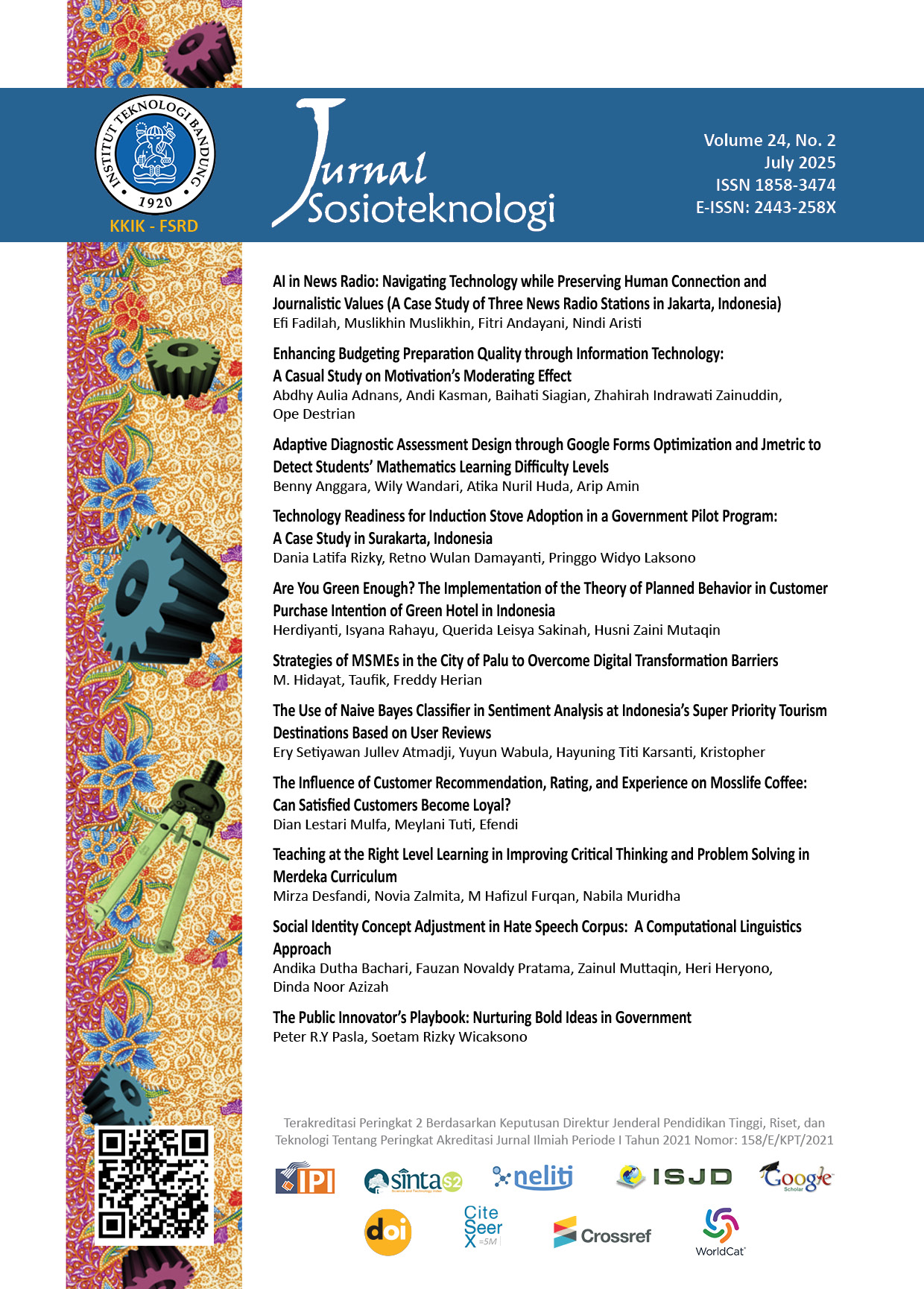Are You Green Enough? The Implementation of the Theory of Planned Behavior in Customer Purchase Intention of Green Hotel in Indonesia
Keywords:
Customer purchase, green hotels, tourism, TPBAbstract
Green hotels are one of the products of sustainable tourism. The theory of planned behavior (TPB) could be a valuable approach for understanding consumer behavior, including visitors' preferences for eco-friendly choices. By looking at sociopsychological components, TPB makes a difference in anticipation, such as tourists' choices to visit green goals or remain eco-friendly. This study aims to examine consumer behavior regarding their interest in staying at a green inn, using the theory of planned behavior (TPB). The research focused on testing the variables of attitude, subjective norm, and perceived behavioral control on customer purchase intention. Data collection was conducted through a questionnaire analyzed by SEM-PLS to determine the causal relationship among latent variables contained in the structural equation with a sample of 121 people who stayed or had stayed at Hyatt Regency Hotel Yogyakarta. The research shows that there is a significant influence among the variables of attitude, subjective norm, and perceived behavioral control on customer purchase intention.
References
Ajzen, I. (2005). Attides, Personallity and Behavior. In International Journal of Strategic Innovative Marketing (Vol. 3, pp. 117–191).
Bashir, A. M., Bayat, A., Olutuase, S. O., & Abdul Latiff, Z. A. (2019). Factors affecting consumers’ intention towards purchasing halal food in South Africa: a structural equation modelling. Journal of Food Products Marketing, 25(1), 26–48. https://doi.org/10.1080/10454446.2018.1452813
Bosio, B., & Bottrill, C. (2016). Sustainable Tourism Management - Best Practices in International Tourism. Entrepreneurship Und Tourismus, April, 185–193.
Chin, W. W. (1998). The partial least squares approach for structural equation modeling. Modern Methods for Business Research, April, 295–336.
Febriasari, P., & Dharmmesta, B. S. (2020). Understanding Indonesian Travelers’ Intention to Stay at Green Hotel. Researchgate.Net, September 2019. https://www.researchgate.net/profile/Puty-Febriasari/publication/336103572_Understanding_Indonesian_Travelers’_Intention_to_Stay_at_Green_Hotel/links/5f5875eaa6fdcc9879d8d0ff/Understanding-Indonesian-Travelers-Intention-to-Stay-at-Green-Hotel.pdf
Fishbein, M., & Ajzen, I. (1975). Belief, Attitude, Intention and Behavior: An Introduction to Theory and Research. Contemporary Sociology, 6(2), 244. https://doi.org/10.2307/2065853
Han, H., Moon, H., & Hyun, S. S. (2020). Uncovering the determinants of pro-environmental consumption for green hotels and green restaurants: A mixed-method approach. In International Journal of Contemporary Hospitality Management (Vol. 32, Issue 4, pp. 1581–1603). https://doi.org/10.1108/IJCHM-04-2019-0354
Kim, J. J., & Hwang, J. (2020). Merging the norm activation model and the theory of planned behavior in the context of drone food delivery services: Does the level of product knowledge really matter? Journal of Hospitality and Tourism Management, 42(November 2019), 1–11. https://doi.org/10.1016/j.jhtm.2019.11.002
Kim, T., & Ha, J. (2022). An Investigation of Customer Psychological Perceptions of Green Consciousness in a Green Hotel Context: Applying a Extended Theory of Planned Behavior. International Journal of Environmental Research and Public Health, 19(11). https://doi.org/10.3390/ijerph19116795
Kwong-Kay Wong, K. (2013). Partial Least Squares Structural Equation Modeling (PLS-SEM) Techniques Using SmartPLS. Marketing Bulletin, 24(1), 1–32.
Muduli, K. kanta, Luthra, S., Kumar Mangla, S., Jabbour, C. J. C., Aich, S., & de Guimarães, J. C. F. (2020). Environmental management and the “soft side” of organisations: Discovering the most relevant behavioural factors in green supply chains. Business Strategy and the Environment, 29(4), 1647–1665. https://doi.org/10.1002/bse.2459
Nitzl, C. (2016). The use of partial least squares structural equation modelling (PLS-SEM) in management accounting research: Directions for future theory development. Journal of Accounting Literature, 37(March), 19–35. https://doi.org/10.1016/j.acclit.2016.09.003
Pahrudin, P., Chen, C. T., & Liu, L. W. (2021). A modified theory of planned behavioral: A case of tourist intention to visit a destination post pandemic Covid-19 in Indonesia. Heliyon, 7(10), e08230. https://doi.org/10.1016/j.heliyon.2021.e08230
Sarmento, E. M., & Loureiro, S. M. C. (2021). Exploring the role of norms and habit in explaining pro-environmental behavior intentions in situations of use robots and Ai agents as providers in tourism sector. Sustainability (Switzerland), 13(24). https://doi.org/10.3390/su132413928
Suki, N. M., & Suki, N. M. (2015). Consumers’ environmental behaviour towards staying at a green hotel: Moderation of green hotel knowledge. Management of Environmental Quality: An International Journal, 26(1), 103–117. https://doi.org/10.1108/MEQ-02-2014-0023
Teng, C. C., Lu, A. C. C., & Huang, T. T. (2018). Drivers of consumers’ behavioral intention toward green hotels. International Journal of Contemporary Hospitality Management, 30(2), 1134–1151. https://doi.org/10.1108/IJCHM-04-2017-0203
Yeh, S. S., Guan, X., Chiang, T. Y., Ho, J. L., & Huan, T. C. T. (2021). Reinterpreting the theory of planned behavior and its application to green hotel consumption intention. International Journal of Hospitality Management, 94(March 2020), 102827. https://doi.org/10.1016/j.ijhm.2020.102827
Zarif Sagheb, M., Ghasemi, B., & Nourbakhsh, S. K. (2020). Factors affecting purchase intention of foreign food products: An empirical study in the Iranian context. British Food Journal, 122(5), 1485–1504. https://doi.org/10.1108/BFJ-05-2019-0318
Published
Issue
Section
Copyright (c) 2025 Isyana Rahayu, Herdiyanti Herdiyanti, Querida Leisya Sakinah, Husni Zaini Mutaqin

This work is licensed under a Creative Commons Attribution-ShareAlike 4.0 International License.







